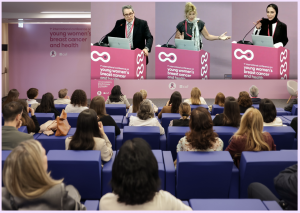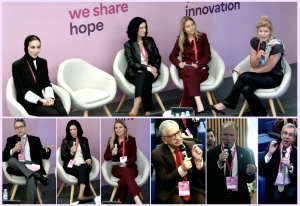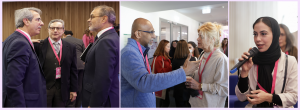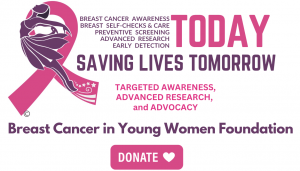
The BCYW Lisbon Meeting Explored Advancements in Unique Biological and Medical Challenges Faced by Young Women
The Discussions Highlighted Personalized Care based on Biology over Age, Stressing Research to Ensure Young Cancer Survivors’ Long-term Health and Well-being.
DENVER, CO, UNITED STATES, December 11, 2024 /EINPresswire.com/ -- At the Breast Cancer in Young Women Foundation's (BCYW Foundation) International Conference in Lisbon, insightful lectures brought together leading global oncologists, researchers, healthcare professionals, and BCYW survivors to address the critical challenges young women face with breast cancer.The session on “BCYW’s Unique Issues: Biological and Medical Challenges” highlighted the distinctive hurdles these women encounter, from chemotherapy toxicity to the need for specialized treatment protocols tailored to this underserved group. The session also stressed the urgency of further research to understand the aggressiveness of tumors in young women with breast cancer.
The speakers emphasized the importance of personalized care and underscored the need to move beyond age-based treatment approaches, focusing instead on tumor biology and genetics. Their discussions illuminated the necessity for advancing research and care models that ensure not only the survival of young women with breast cancer but also their long-term well-being, with particular attention to fertility, hormonal health, and individualized treatment plans.
CHEMOTHERAPY TOXICITIES AND FERTILITY CONCERNS
Miguel Martín Jiménez, M.D., Ph.D., focused on the long-term impacts of chemotherapy on young women, noting that the challenges faced by younger patients are distinct from those encountered by older women. While the short-term toxicities of chemotherapy are widely recognized, the long-term effects, particularly on fertility and ovarian function, are increasingly concerning for young women undergoing cancer treatment.
“Young women generally live longer than older women, which means they have a higher likelihood of experiencing long-term side effects from their cancer treatments,” Dr. Jiménez, explained. He highlighted the importance of addressing these concerns to improve the quality of life for young women survivors.
Dr. Jiménez, also discussed how chemotherapy, especially alkylating agents, can damage ovarian cells, particularly granulosa cells, leading to DNA damage and functional impairments. He emphasized that "chemotherapy regimens containing cyclophosphamide are particularly harmful to ovarian function, especially when extended over six or more cycles."
Data shared by Dr. Jiménez, revealed that "ovarian function recovery is age-dependent, with women under 30 having the highest chance of recovery, while those in their late 30s or older are more likely to experience irreversible damage." He also addressed premature menopause, which affects many young women undergoing chemotherapy, causing them to enter menopause up to a decade earlier than the average woman. He stressed that this early onset of menopause heightens the risk of age-related health issues such as osteoporosis and cardiovascular disease.
Another advancement in hormone receptor-positive breast cancer is the POSITIVE trial, which showed that temporarily pausing hormone therapy to pursue pregnancy does not increase the risk of cancer recurrence.
Dr. Jiménez, reviewed fertility preservation options, including the use of GnRH analogs, which have shown promise in protecting ovarian function during chemotherapy. "With the global trend of women having children later in life, particularly in countries like Spain where the average age of first childbirth is over 32, the importance of fertility preservation is increasingly critical," he noted.
Dr. Jiménez, concluded, “We must integrate fertility preservation, hormonal management, and personalized treatment strategies to ensure that young women who survive cancer can live healthy and fulfilling lives.”
TREATMENT ADVANCEMENTS AND CHALLENGES
Marie Jeanne Vrancken Peeters, M.D., Ph.D., a breast cancer survivor and advocate for personalized care, began by sharing her own experience with breast cancer in her early twenties. “My doctors went beyond age-based treatment guidelines and focused on the biology of my tumor; this approach changed my life,” she reflected.
Dr. Vrancken Peeters stressed the importance of de-escalating unnecessary treatments for young women. She highlighted several ongoing trials aimed at improving outcomes for young women with breast cancer, including the SOUND study, which demonstrated that omitting central lymph node biopsy in select early-stage cases resulted in excellent survival rates and low recurrence. She also pointed out the underrepresentation of young women in clinical trials and the need for more inclusive research.
Dr. Vrancken Peeters also discussed the role of targeted therapies in reducing chemotherapy toxicity. She cited the Train-2 and Train-3 trials for HER2-positive breast cancer, which showed that young women who received reduced chemotherapy regimens combined with dual HER2 blockade achieved comparable pathologic complete response (PCR) rates to more aggressive treatments, providing hope for less toxic treatment options.
Furthermore, Dr. Vrancken Peeters spoke about advancements in axillary treatment, noting that modern techniques such as iodine seed marking and selective node removal after systemic therapy have reduced the need for axillary clearance. As a result, 80% of patients avoided this procedure, with five-year follow-up data showing low recurrence rates, even among the youngest patients.
Dr. Vrancken Peeters concluded, “Age is just one factor among many. We must focus on tumor biology rather than blanket approaches based solely on a patient's age. By including young women in research and focusing on tumor biology, we can create better outcomes for this underserved group.”
GENOMIC INSIGHTS OF BREAST CANCER AGGRESSIVENESS
Marah Tabbal, a senior graduate fellow at MBR University of Medicine and Health Sciences in Dubai, discussed the rising global incidence of breast cancer in younger women, with over 45% of cancer diagnoses in the UAE occurring between the ages of 20 and 49.
Miss Tabbal highlighted several risk factors for early-onset breast cancer, including early pregnancies and breastfeeding, which are traditionally considered protective. However, she pointed to a paradox in the UAE: despite early marriages, multiple pregnancies, and widespread breastfeeding, young Emirati women still experience aggressive tumors. This suggests the presence of unique genetic and environmental factors in the region.
Her genomic research revealed distinct genetic mutations and overexpressed genes in younger patients, contributing to tumor metastasis and resistance to treatments. Miss Tabbal explained, “Amplified genes in younger patients enhance tumor metastasis and resistance to treatments, which is why younger patients tend to have more aggressive disease.” She also emphasized the underrepresentation of Middle Eastern and African populations in genomic studies.
Miss Tabbal echoed the sentiments of other speakers, stating, “By understanding the unique genetic and environmental factors at play, particularly in underrepresented populations, we can develop personalized treatment strategies. It’s not just about improving survival rates—it’s about giving young women their futures back.”
TOWARDS MORE PERSONALIZED APPROACHES
The discussions at the conference underscored the need for personalized treatment approaches based on tumor biology and genomic factors rather than relying solely on age-based strategies. As the number of young women surviving cancer continues to grow, the need for innovative research and treatment options to ensure their long-term health and well-being has never been more critical. The goal is to provide these women the best possible chance for a healthy, fulfilling life post-treatment.
ABOUT THE BCYW FOUNDATION
The BCYW Foundation is a global organization dedicated to advancing research, raising awareness, and providing support to young women affected by breast cancer. Through partnerships and advocacy, the foundation is committed to creating a future where no young woman feels overlooked in her fight against this disease. The BCYW Foundation relies on individual contributions and sponsors to raise the funds necessary to support its mission. Donate to BCYW Foundation: Every contribution – big or small – helps the BCYW Foundation fulfil its mission to save the lives of young women from breast cancer in the years to come. Thank you for your generosity.
Rakesh Kumar, Ph.D., Founder and CEO
Breast Cancer in Young Women Foundation
bcywf@breastcancerinyoungwomen.org
Visit us on social media:
Facebook
X
LinkedIn
Instagram
YouTube
Distribution channels: Culture, Society & Lifestyle, Education, Healthcare & Pharmaceuticals Industry, International Organizations, Science
Legal Disclaimer:
EIN Presswire provides this news content "as is" without warranty of any kind. We do not accept any responsibility or liability for the accuracy, content, images, videos, licenses, completeness, legality, or reliability of the information contained in this article. If you have any complaints or copyright issues related to this article, kindly contact the author above.
Submit your press release



